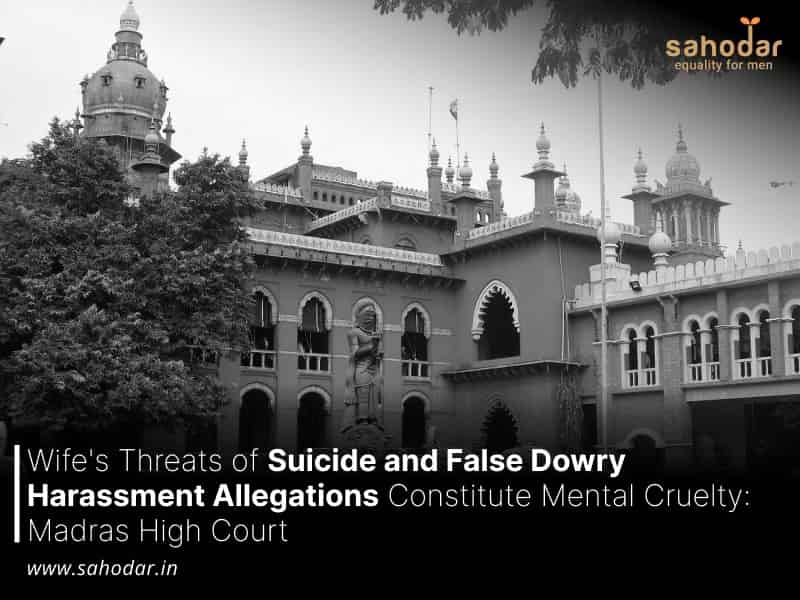While granting a divorce to the husband, the Madras High Court recently held that a wife’s threats to commit suicide constitute cruelty.
Justice S. Srimathy observed that within 8 months of marriage, the husband had written letters to his mother expressing his distress, stating that his wife was threatening to end her life. The court found that this behavior amounted to mental cruelty.
“The said letter was written on 21.02.2005 within eight months from the date of marriage i.e. 16.05.2004 and the letter clearly indicates the agony of the husband where it states the wife is threatening to commit suicide, hence the same cannot be brushed aside. Therefore, this Court is of the considered opinion that there is an element of mental cruelty,” the court said.
The court further observed that the wife had lodged a false dowry harassment case against the husband and his family, damaging their reputation. It was noted that the wife used the false allegations as a means to threaten the husband, which amounted to cruelty.
“Repeatedly the Courts have held that the dowry harassment cases are used as a tool and false cases are filed. In the present case also, it is a false dowry harassment case. Therefore, this Court is of the considered opinion that the wife filed false dowry harassment case, but the same is used as tool by the wife to threaten the husband, which amounts to cruelty,” the court observed.
The court was considering the husband’s appeal challenging the lower court’s decision, which had granted the wife’s petition for restitution of conjugal rights and rejected the husband’s divorce petition based on grounds of cruelty.
The husband claimed that his wife prevented him from meeting his family and threatened to commit suicide and file a false dowry case if he attempted to maintain contact with them. He further stated that during their daughter’s first birthday celebration, when his mother came to attend, the wife attempted suicide and had to be hospitalized. He also alleged that the wife visited his workplace and created a scene, disrupting him during his working hours.
The husband further claimed that after he sent a legal notice seeking a divorce, the wife’s family visited his parents’ house and threatened them with serious consequences. He added that following this incident, the wife filed a police complaint accusing him and his family of dowry demands.
In response, the wife denied all allegations, asserting that it was the husband and his family who had been persistently demanding dowry. While she initially rejected the accusation of attempting suicide, she later admitted that she tried to end her life because their daughter’s birthday celebration was disrupted due to family disputes. She also denied that her family had insulted or threatened the husband and his parents.
Although the wife’s counsel contended that a single act of attempting suicide should not be deemed cruelty, the court observed that the wife had repeatedly threatened to take her own life, as evidenced by the facts of the case. The court also considered the hospital’s discharge summary, which confirmed her suicide attempt. Additionally, it found no reason to doubt the testimony of the husband’s father, noting that in such situations, direct evidence may be lacking, but the case could be supported by the couple’s conversations.
The court observed that although the wife accused the husband of demanding dowry, evidence showed that the husband had secured bank loans to buy the car and other items, indicating that the dowry allegations were false.
The court further noted that the wife, who was engaged in private practice, had put up a name board displaying the husband’s name, which could have adversely impacted his career as a government employee. The court was also convinced that the wife and her family had threatened and humiliated the husband and his relatives, as demonstrated by the repeated complaints he had filed with the police authorities.
Observing that the husband had endured mistreatment from the wife and her family and had been seeking a divorce for the past 17 years, the court upheld his appeal and granted the divorce.

